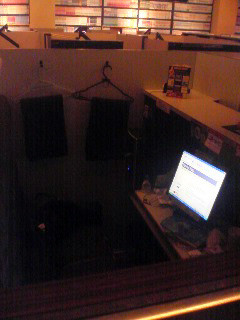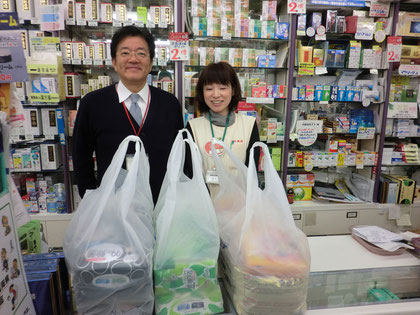Five days of constant posts and then nothing. My apologies.
I spent the last few days in Hiroshima. I’d been watching the numbers out of Fukushima Dai-ichi grow on the 16th, and when I woke up on the 17th to find that the embassies had expanded the no-go zone to 80 km and advised people to consider leaving Tokyo, that seemed like the right point to make a retreat. I gave my condolences to my boss, rode my bike an hour and a half back up to my apartment, packed for immediate evacuation and got onto an eerily normal train for Tokyo Station.
The Shinkansen south wasn’t exceptionally packed, but there were quite a few young children on board. It was nice to hear kids laughing at silly things. It was nice to see Mt. Fuji. It was nice to be delayed by a peaceful blanket of snow over Shiga Prefecture and not by a quake or a power outage. These were all things I’d forgotten.
With so many departures already, I was taken aback by the look of panic on my boss’ face when I told him I was leaving. The others remaining behind were all directly responsible for making sure our teachers were okay, and I understood their need to stay. I was just responsible for putting some tertiary information online. I was hardly essential. But that look from my boss was enough to make me reconsider my destination.
Instead of heading to Kansai International Airport, I stayed on the train past Osaka and headed for Hiroshima.
Why?
First of all, I was less concerned about radiation than about a population equivalent to all of Canada trying to stuff itself out a thoroughfare the size of the St. Lawrence. Resources were already tight in Tokyo, and as refugees came in, it would get even worse. I figured leapfrogging to Hiroshima would eliminate the possibility of resource strain spreading to Osaka, the first choice for evacuees from Tokyo. If nothing else, Okayama Prefecture is right next door, and it’s nothing but rice.
The second reason what that it seemed appropriate and ironic to flee radiation by going to Hiroshima. They’ve dealt with it, and they saw it through. I figured nothing could faze them.

I set up a rogue camp in a net café and got back to business. For about 24 hours I lived in a 2m x 1m slot with two computers supported by a free drink machine down the aisle. They even have showers in Japanese net cafés, a feature of which I made use sometime in the middle of the night.
When I mentioned where I’d come from, the guy at the counter said, “Oh, those earthquakes must be really rough.” When I corrected that, as far as Tokyo was concerned, the real problem was the nuclear reactor, he gave me a blank look. It looked like I was in the right place.
Walking through the streets, I was suddenly conscious of how much my mental state had already changed. I had a sense of hyper-awareness. I wasn’t looking for any one thing, but just looking, all senses up, not quite paranoid but alert. I got irritated with people for being fashionable when others in the north had no clothes, for looking calm and at peace while everyone north of Shizuoka was on edge. Just the fact that people were smiling threw me off. Then again, people don’t smile in Tokyo normally—but I realized how long it had been since I had done so myself. It drove home how easy I was taking it while others suffered.
In a vanity aside, I also discovered that riding your bike an hour and a half through Tokyo traffic and then neglecting to wash your face for two days will do some remarkably awful things to your complexion. After my ride into the Tokyo office, I’d spent one night on the floor and another in a hotel.
The next night I set up Command Center III in a hotel. It seemed that one person wasn’t allowed to use a two-person computer pod on a weekend.
Quickly getting tired of missing half the key information because I couldn’t write fast enough, I bought a digital camera so I could take literal “screen captures” from the TV in my hotel room. Even in Hiroshima, the Yamada Denki was out of flashlights and nearly out of rechargeable batteries, while the Tokyu Hands a block away was almost out of candles. It looked like the quake had had some effect down here after all.
On Sunday and Monday there were groups of people in downtown Hiroshima asking for donations for quake victims. I’d already stuffed ¥10,000 into a Red Cross basket by a Prada store, and I wasn’t sure how much I should give. I stood and watched as people indifferently walked by a group of men calling out in unison on a corner, and realized that there was something I could indeed do beyond giving money. I went up, asked what they were doing, told them where I was from, and thanked them. Then I gave them a ¥1000 note. Then I went around the corner and spent about five minutes pulling myself together.
After that I went and found all the other groups in the area and thanked them. I did the same again on Monday. I didn’t give any more money—celebrities are dropping millions on the Red Cross, and my little donation feels like a drop in the bucket. But then I went to a department store where they were collecting not for the Red Cross, but for the local city centres in affected areas. I gave them ¥5,000, and they thanked me as much as I thanked them.
On Monday I called around several NPOs and NGOs to see if they were taking volunteers. The big ones weren’t—it seems you’ve got to be ready to go before the emergency, and they provide you with training. But the smaller ones seemed more open, and while they didn’t have anyone going north just yet, I registered my name and number with two of them. I decided to head back up.
Before leaving Hiroshima on Tuesday morning, I headed out to the Peace Park. I wanted to pay my respects and ask for strength or guidance or whatever I could find there. I didn’t pick up any clear messages, but I walked away feeling like I’d done what I could in Hiroshima.
A friend of mine is involved with Second Harvest, which has had its own trucks heading north since shortly after the quake. She told me they needed moist tissues, which seem to be in short supply in Tokyo. On the way back from the Peace Park I bought as many as they had in a pharmacy, then filled up my other arm with “kairo” hand-warmer packs. The staff were very helpful. Then when I got to Tokyo it took me an hour of wandering like a bag man before I found the drop-off site. The staff said “Thanks” and sent me on my way. It felt a little anticlimactic.
I lugged 6 kg of bottled water all the way up from Hiroshima only to find the shelves fully stocked in Tokyo when I arrived. Then tonight they found radiation in the water and the shelves are empty again. So maybe I wasn’t so stupid after all.
It’s funny. After every report, the comment ends with “…and at these levels there’s no reason to worry.” I used to think Radiation = Death. Now it’s like having more-than-desirable levels of any other pollutant. I’m finding myself a little extra-careful in the rain, however.
Today I had my first "tei-den" (power outage) experience. The trains were running, but all the lights were out, including the traffic lights. I did, however, confirm that the code-lock on my door runs off a battery, not grid power, so I was able to get in after all.
There are 2,500 refugees from Fukushima living in Saitama Super Arena about 2 km from my apartment. I want to see if there’s something I can do to help them. I swung by today, and at 1:00 they said they had all the volunteers they needed.
It would seem I’ve got some time on my hands, though. Thanks to my little “I’m-off-to-Hiroshima” disappearing act, I got back to the office only to be told to take a week of leave. It actually ties in well with my plans—I’m hoping to get going early tomorrow so I can volunteer at the arena. If that doesn’t work, I’ll try Second Harvest again. We’ll see what happens.




Write a comment
Rob (Wednesday, 23 March 2011 18:59)
Good show, Kanert. Keep it up.
mom (Monday, 28 March 2011 22:03)
Thank you!